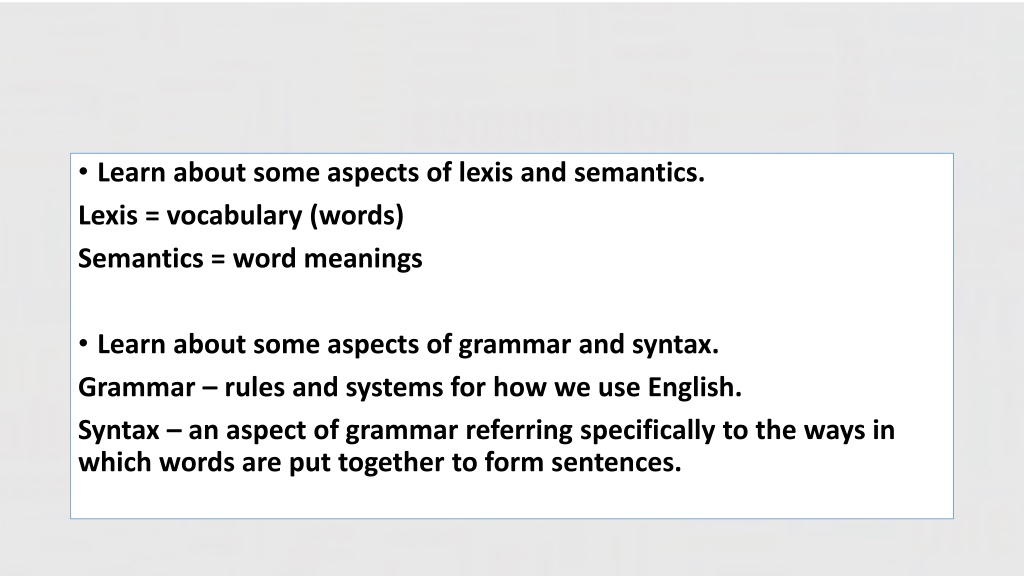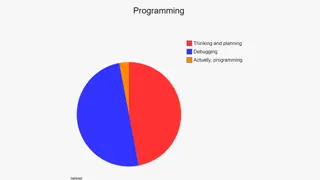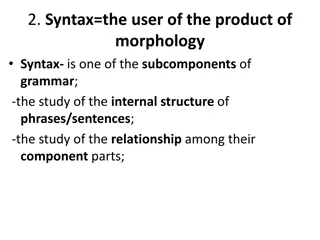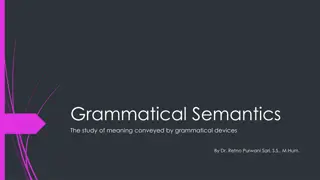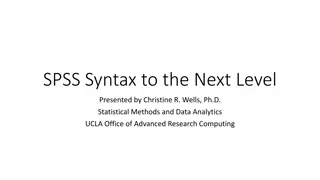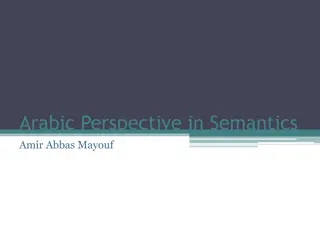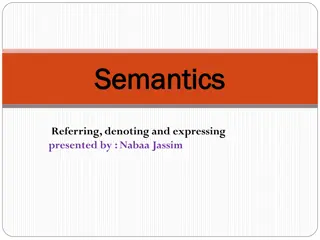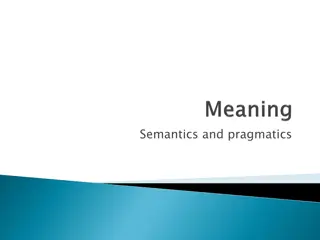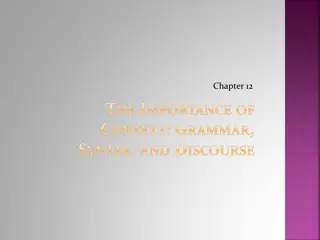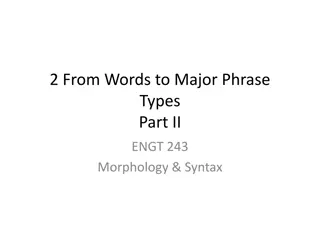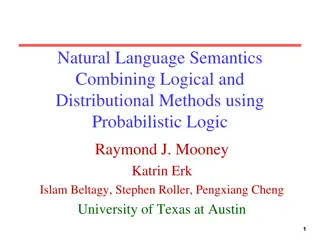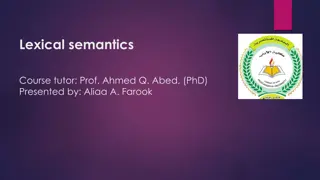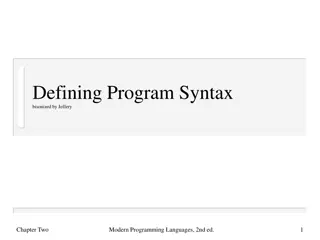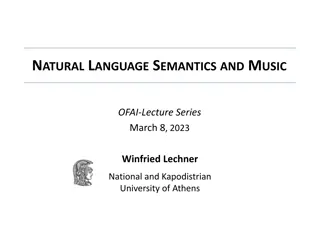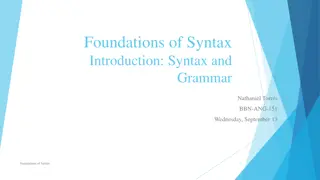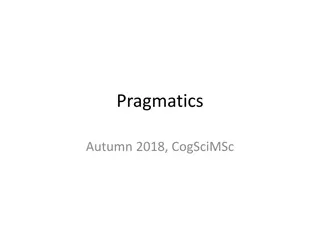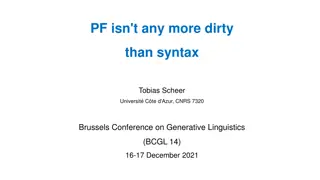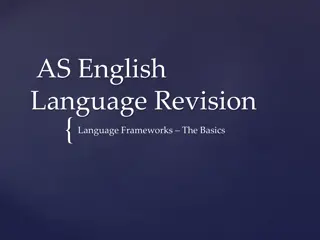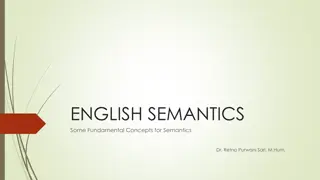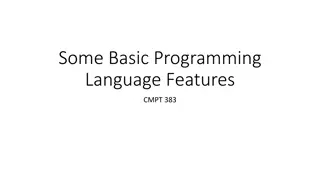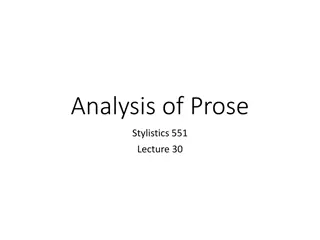Understanding Language Structure: Lexis, Semantics, Grammar, and Syntax
Explore the basics of language structure including lexicon and semantics, grammar rules, syntax, elements of noun phrases and clauses, and types of sentences. Dive into vocabulary, word meanings, semantic fields, connotation vs. denotation, and sentence structures. Enhance your understanding of how words, meanings, and grammar work together to form coherent communication.
Download Presentation

Please find below an Image/Link to download the presentation.
The content on the website is provided AS IS for your information and personal use only. It may not be sold, licensed, or shared on other websites without obtaining consent from the author. Download presentation by click this link. If you encounter any issues during the download, it is possible that the publisher has removed the file from their server.
E N D
Presentation Transcript
Learn about some aspects of lexis and semantics. Lexis = vocabulary (words) Semantics = word meanings Learn about some aspects of grammar and syntax. Grammar rules and systems for how we use English. Syntax an aspect of grammar referring specifically to the ways in which words are put together to form sentences.
Terminology Lexis another term for vocabulary Semantics study of word meanings A semantic field is a group of words with associated meanings or uses. For example, the semantic field for football includes lexis such as goal, penalty, referee, offside, touchline, tackle, players etc. Which semantic field would the following lexis fit into? Teacher, pens, pupils, desks, rules Semantic field - School
Terminology: Connotation vs denotation https://www.youtube.com/watch?v=N8hRotU-b5c Word Denotation Connotation bright decayed abandoned shadows
Noun phrases A phrase is one or more words, functioning as a unit in a sentence, usually containing a head word and modifiers. A noun phrase has a noun as its head word. E.g. The house The old house The house across the road The beautiful, old house The house over there The head word in all of these examples is house. In each case with a pre-modifying determiner (the). Many noun phrases also have adjectives that act as pre-modifiers (old and beautiful are used in this way). The last two examples have post-modifiers (over there and across the road).
Clauses Phrases can be combined to form clauses. A clause has to contain a verb phrase. There are elements needed to form clauses. A visitor called the old house a ruin yesterday. SUBJECT A visitor VERB called OBJECT the old house COMPLEMENT a ruin (extra information) ADVERBIAL yesterday (time, place or manner) Clauses do not have to contain all 5 elements. This is an example of one that does. Have a go at the clauses below. The first one has been done for you: 1. He closed his eyes S + V + O 2. John handed Mark a key 3. She smiled 4. She put the money on the table.
Simple, compound and complex sentences Simple, compound and complex sentences Simple one clause. Compound two simple sentences joined by a conjunction. Complex one or more of the clauses is less important than the main clause. These lesser clauses are called subordinate clauses. Remember, a subordinate clause cannot make sense on its own. Identify the sentence types below. She failed her driving test. He had 50 lessons but he failed the test. She had 50 lessons but failed her test. The man, who thought he would definitely pass, was disappointed to fail. The lorry failed to stop after the accident. simple compound compound complex complex
Sentence moods Sentence moods another way of classifying sentences is to identify their another way of classifying sentences is to identify their functions or moods. functions or moods. Declarative sentences These are the most common type. They make statements or provide information. E.g. Helen is 18. She starts university next month. Interrogative sentences These ask questions. E.g. Where have you been? How old is she? Imperative sentences These issue commands, advice, instructions etc. They usually begin with a verb and leave out the subject. E.g. Close the door please. Sit down and listen carefully to what I am going to tell you. Exclamatory sentences These begin with what or how and often lack a verb. E.g. What a great match!
Sentence Sentence type Sentence mood The girl is quite sneaky. simple declarative The driver swerved violently in order to avoid an oncoming car. complex declarative Did anyone see the registration number? interrogative simple The pedestrian, who was short-sighted, didn t see the car coming. complex declarative simple declarative I told you to keep quiet. The young boy ran to the nearest house and knocked on the door. declarative compound What a terrible day! simple exclamatory complex How was the driver after the accident? interrogative simple Respond immediately. imperative
